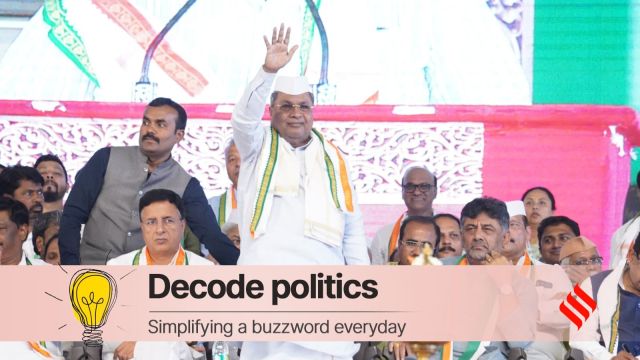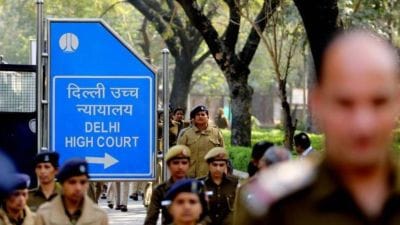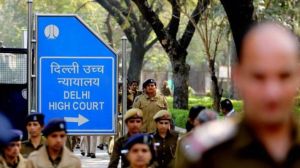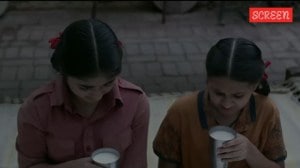Decode Politics: Two events, and why Karnataka govt is marking their centenary
Siddaramaiah announces the commemoration of the Congress’s Belagavi session, the only one addressed by Mahatma Gandhi, and the formation of a crucial anti-caste body by B R Ambedkar.
 Karnataka Chief Minister Siddaramaiah said the Congress government in the state will commemorate the centenaries. (X/@Siddaramaiah)
Karnataka Chief Minister Siddaramaiah said the Congress government in the state will commemorate the centenaries. (X/@Siddaramaiah)In his Independence Day address on Thursday, Karnataka Chief Minister Siddaramaiah said the Congress government in the state will commemorate the centenaries of the Belagavi session of the Indian National Congress and the establishment of the Bahishkrit Hitkarini Sabha by B R Ambedkar.
“When we take a look back at the times of freedom movement, this year – 2024 – is very important in many ways. Mainly, the historical Belagavi session of the Indian National Congress held in 1924 completes 100 years. Another historical event of establishing Bahishkrit Hitakarini Sabha by Dr B R Ambedkar also completes 100 years,” Siddaramaiah said.
What was the significance of the Belgaum session of 1924?
This remains the only Congress session presided over by Mahatma Gandhi as president of the party, where he laid out his ideas regarding non-violence, Hindu-Muslim unity as well as Swaraj.
Belgaum, the site of the session, was then a part of the Bombay State.
In his speech, Gandhi underlined his ideas of non-violence. Referring to the non-cooperation movement, he said that while the idea of non-violence might not have panned out as planned (with that movement called off in the wake of the Chauri-Chaura police station attack incident), it was the effective way ahead.
“At the Special Session of the Congress at Calcutta in 1920, the boycott of Government titles, law-courts, educational institutions, legislative bodies and foreign cloth was resolved upon. All the boycotts were more or less taken up by the parties concerned… Though not a single boycott was anywhere near completion, every one of them had undoubtedly the effect of diminishing the prestige of the particular institution boycotted. The most important boycott was the boycott of violence….”
He went on to add: “ Just as certain acts such as personal abuse, irritating conduct, lying, causing hurt and murder are symbols of violence, similarly courtesy, inoffensive conduct, truthfulness, etc. are symbols of non-violence. And so to me, a boycott of foreign cloth is a symbol of (choosing) non-violence cloth. Revolutionary crime is intended to exert pressure. But it is the insane pressure of anger, ill-will. I contend that non-violent acts exert pressure far more effectively than violent acts, for that pressure comes from goodwill and gentleness.”
Linking Hindu-Muslim unity and fighting untouchability to attaining self-rule, Gandhi said: “Untouchability is another hindrance to Swaraj. Its removal is just as essential for Swaraj as the attainment of Hindu-Muslim unity. This is an essentially Hindu question and Hindus cannot claim or take Swaraj till they have restored the liberty of the suppressed classes.”
Talking about Swaraj, Gandhi offered suggestions such as that the final court of appeals not be in London but Delhi, and that the official language for provincial governments, legislatures and courts be Hindustani, among others.
“I have repeatedly stated that satyagraha never fails and that one perfect satyagrahi is enough to vindicate Truth. Let us all strive to be perfect satyagrahis. The striving does not require any quality unattainable by the lowliest among us. For satyagraha is an attribute of the spirit within. It is latent in every one of us. Like Swaraj, it is our birthright. Let us know it,” he said, wrapping up his address.
What was the Bahishkrit Hitakarini Sabha?
Sociologist Gail Omvedt who worked extensively on caste wrote in her book Dalits and the Democratic Revolution: Dr Ambedkar and the Dalit Movement in Colonial India about Ambedkar returning to India from London in 1923, and taking up work as a lawyer while also teaching at Sydenham College in Mumbai.
In 1924, Omvedt wrote, Ambedkar founded the Bahishkrit Hitakarini Sabha – or Society for Welfare of the Ostracised – as “a forum for gathering people and organising occasional forays into the countryside for conferences and meetings”. The organisation’s slogan went on to be “Educate, agitate, organise” – the rallying cry of Dalit movements in India till date.
In 1926, Ambedkar became one of the two Dalit representatives nominated to the British-era Legislative Council.
Omdvet wrote that Ambedkar became “the focal point for the surging aspirations of the Dalits, as untouchables throughout western Maharashtra wrote to him, seeking to find an outlet to publish the struggles they were waging, the atrocities they faced”.
On March 19 and 20, 1927, the BHS along with the Kolaba Zilha Bahishkrit Parishad (Kolaba District Unit of Those Ostracised) organised a mass rally in Mahad. The municipality of the town in the Konkan had thrown open a tank to Dalits, but they were being stopped from accessing it.
This eventually became a pivotal movement in India’s Dalit history, which came to be known as the Mahad Satyagraha, when thousands of members of the Depressed Classes gathered and marched to the Chavdar Lake in Mahad. They drank water from it and asserted their right to equality and equal access to public resources.





- 01
- 02
- 03
- 04
- 05


























